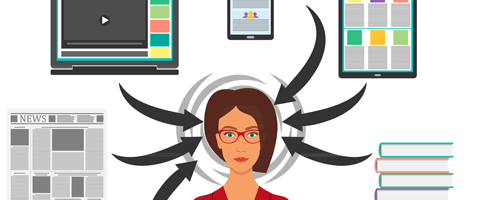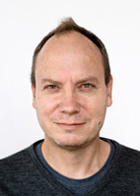The battle for our attention
Morten Axel Pedersen, professor at the Department of Anthropology and deputy director of Copenhagen Center for Social Data Science, has just been awarded an Advanced Grant from the European Research Council. He will lead the research project DISTRACT, which explores the battle for our attention.

Has our attention become a scarce resource? In a new interdisciplinary project social scientists explore the interaction between distraction and digitization.
- The purpose is to examine attention as a scarce resource in one of the world's most digitized countries - namely Denmark, says Morten Axel Pedersen, professor at the Department of Anthropology, Faculty of Social Sciences, University of Copenhagen.
He is Principal Investigator of the new research project 'DISTRACT - The Political Economy of Distraction in Digitized Denmark,' which is carried out at Copenhagen Centre for Social Data (SODAS) and the Department of Anthropology, University of Copenhagen.
-DISTRACT will strengthen the Department of Anthropology, Copenhagen Center for Social Data Science and the social sciences. The project is carried out by a strong team of researchers, who will explore digital Denmark in an original way with interdisciplinary methods, Helle Samuelsen, Head of the Department of Anthropology, says.
Our digital footprint
DISTRACT will produce knowledge about the political economy of attention. An example of the political economy of attention would be that leading tech companies such as Facebook and Google through the use of their services collect enormous amounts of data on digital behavior, which can be used as targeted commercials or messages, Morten Axel Pedersen explains:
- In the twentieth century oil was the ultimate scarce resource, and the world's largest companies were typically oil companies. The large tech companies have in many ways now taken over this position, and a global and local competition about attracting and maintaining people's attention is playing out in these years and years to come, he says.
The researchers will develop new data scientific methods, that combine field observations and other ethnographic data with big social data.
- Expressed in popular terms, we wish to combine all the best from the anthropology with all the best from data science and from quantitative social sciences, Morten Axel Pedersen explains.
From digital politics to digital detox
The project is divided into four interdisciplinary teams, who investigate the fight for attention. The researchers will among other things look at digital politics, public-private collaboration on digitization, initiatives on digitization and anti-digitization at educational institutions, and counter-cultures like 'digital detox.'
- A part of the investigation will be concerned with those groups that consciously choose to go offline and then display this. We will not only examine the digital economy but also the new popular movements and the political ideas and ideologies that arise together with and against the digitization, Morten Axel Pedersen says.
In the interdisciplinary research project Assistant Professor Kristoffer Albris and Research Assistant Eva Iris Otto (Department of Anthropology), Associate Professor Anders Blok (Department of Sociology), Professor David Dreyer Lassen (Department of Economics), and Professor Sune Lehmann Jørgensen (DTU and SODAS) will also participate, and it is expected to take on more researchers to work on the project.
’DISTRACT - The Political Economy of Distraction in Digitized Denmark’ runs for five years.
Contact
Professor Morten Axel Pedersen
Mail: morten.pedersen@anthro.ku.dk
Phone: 31 31 46 30
Maj Bach Madsen
Communications Officer
Mail: mbm@samf.ku.dk
Phone: 35 32 63 50
Read more about ERC Advanced Grant
Read more about ERC Advanced Grant at the European Research Council.
Other ERC Grants, Department of Anthropology
• Consolidator Grant: The research project ‘Criminal Entanglements’. Explores social infrastructure of organized crime.
• Starting Grant: 'The Vitality of Disease.’ Focuses on how the healthcare system seeks to improve the life of those living with disease.
• Advanced Grant: The research project 'Waterworlds.' Examines how communities around the world handle climate changes.
